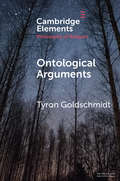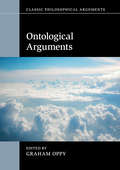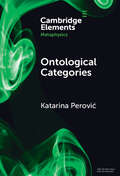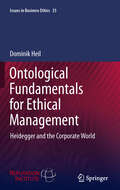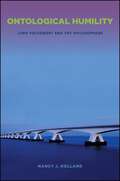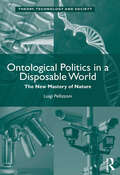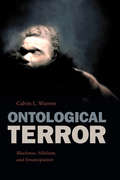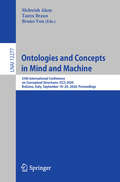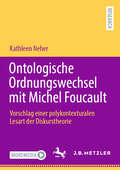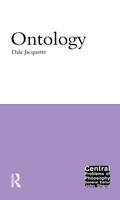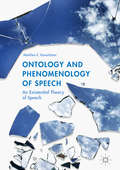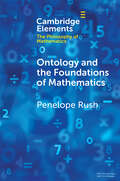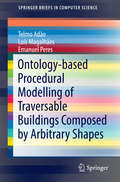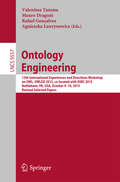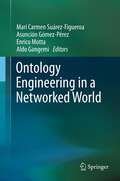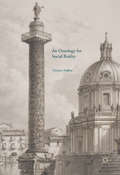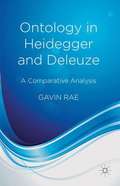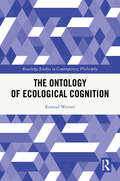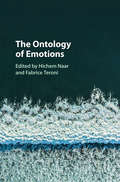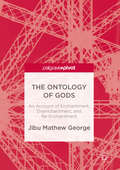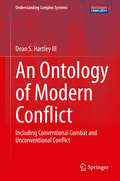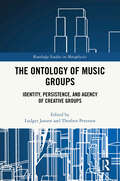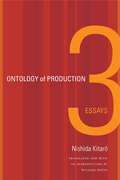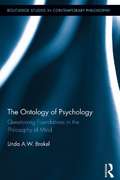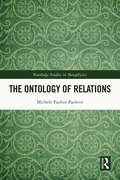- Table View
- List View
Ontological Arguments (Elements in the Philosophy of Religion)
by Tyron GoldschmidtProving the existence of God is a perennial philosophical ambition. An armchair proof would be the jackpot. Ontological arguments promise as much. This Element studies the most famous ontological arguments from Anselm, Descartes, Plantinga, and others besides. While the verdict is that ontological arguments don't work, they get us entangled in fun philosophical puzzles, from philosophy of religion to philosophy of language, from metaphysics to ethics, and beyond.
Ontological Arguments (Classic Philosophical Arguments)
by Graham OppyOntological arguments are one of the main classes of arguments for the existence of God, and have been influential from the Middle Ages right up until the present time. This accessible volume offers a comprehensive survey and assessment of them, starting with a sequence of chapters charting their history - from Anselm and Aquinas, via Descartes, Leibniz, Kant and Hegel, to Gödel, Plantinga, Lewis and Tichý. This is followed by chapters on the most important topics to have emerged in the discussion of ontological arguments: the relationship between conceivability and possibility, the charge that ontological arguments beg the question, and the nature of existence. The volume as a whole shows clearly how these arguments emerged and developed, how we should think about them, and why they remain important today.
Ontological Categories: A Methodological Guide (Elements in Metaphysics)
by Katarina PerovicOntology – the study of the most fundamental categories of being – lies at the very heart of metaphysics. The reason why it appears to be so central is because it takes on the following questions: What sorts of entities are there? What features do those entities have? How do they relate to one another? And so on. Section 1 of this Element presents a fast-paced historical overview of some of the notable approaches to these questions. Section 2 tells the story of how one of the oldest, most disputed, but also most developed ontological categories – universals – got introduced. Section 3 builds on the discussion of universals as it considers the desiderata for a promising system of ontological categories. And Section 4 looks at ways in which philosophers might break with tradition and explore some new ontological categories.
Ontological Fundamentals for Ethical Management: Heidegger and the Corporate World
by Dominik HeilThe book develops a philosophical foundation to the field of management education using the work of Martin Heidegger as a guiding philosophy. It asks the questions 'what is a corporation?' and 'what is corporate management?' These two questions are foundational for management thought in general and management ethics in particular. Most other academic fields are in some way defined and guided by a philosophical discourse. This philosophical discourse is largely missing in the field of management thought and education. Without this foundation it can never be clear what actually belongs into a certain academic discipline and what does not. It also therefore lacks a sound and well articulated ontological foundation critical for developing approaches to ethical management. This book seeks to fill this gap and consequently represents an interdisciplinary effort between the academic field of management/business administration and philosophy, which is vital for business ethics. Intended as required reading for an elective on philosophy of management that is offered annually at the Wits Business School / University of the Witwatersrand / Johannesburg. The structure of the course will be largely based on the structure of the book.
Ontological Humility: Lord Voldemort and the Philosophers
by Nancy J. HollandNeither self-effacing modesty nor religious meekness, ontological humility is a moral and philosophical attitude toward transcendence—the unknown and unknowable background of existence—and a recognition and awareness of the contingency and chance that influence the course of our lives. It is a concept that Nancy J. Holland finds both throughout the history of philosophy and across the volumes of J. K. Rowling's Harry Potter series. Tracing it through the philosophical thought of figures ranging from Descartes, Hume, and Kant to Heidegger, Beauvoir, Merleau-Ponty, and Derrida, Holland uses the Harry Potter saga as a guide to illustrate the concept, revealing a whole set of ethical imperatives. Connecting the concept to contemporary gender and race theory, she demonstrates its implications both for our understanding of the philosophical tradition and for the way we live our own lives.
Ontological Politics in a Disposable World: The New Mastery of Nature (Theory, Technology And Society Ser.)
by Luigi PellizzoniThis book explores the intertwining of politics and ontology, shedding light on the ways in which, as our ability to investigate, regulate, appropriate, ’enhance’ and destroy material reality have developed, so new social scientific accounts of nature and our relationship with it have emerged, together with new forms of power. Engaging with cutting-edge social theory and elaborating on the thought of Foucault, Heidegger, Adorno and Agamben, the author demonstrates that the convergence of ontology with politics is not simply an intellectual endeavour of growing import, but also a governmental practice which builds upon neoliberal programmes, the renewed accumulation of capital and the development of technosciences in areas such as climate change, geoengineering and biotechnology. With shifts in our accounts of nature have come new means of mastering it, giving rise to unprecedented forms of exploitation and destruction - with related forms of social domination. In the light of growing social inequalities, environmental degradation and resource appropriation and commodification, Ontological Politics in a Disposable World: The New Mastery of Nature reveals the need for new critical frameworks and oppositional practices, to challenge the rationality of government that lies behind these developments: a rationality that thrives on indeterminacy and an account of materiality as comprised of fluid, ever-changing states, simultaneously agential and pliable, to which social theory increasingly subscribes without questioning enough its underpinnings and implications. A theoretically sophisticated reassessment of the relationship between ontology and politics, which draws the contours of a renewed humanism to allow for a more harmonious relationship with the world, this book will appeal to scholars in social and political theory, environmental sociology, geography, science and technology studies and contemporary European thought on the material world.
Ontological Terror: Blackness, Nihilism, and Emancipation
by Calvin L. WarrenIn Ontological Terror Calvin L. Warren intervenes in Afro-pessimism, Heideggerian metaphysics, and black humanist philosophy by positing that the "Negro question" is intimately imbricated with questions of Being. Warren uses the figure of the antebellum free black as a philosophical paradigm for thinking through the tensions between blackness and Being. He illustrates how blacks embody a metaphysical nothing. This nothingness serves as a destabilizing presence and force as well as that which whiteness defines itself against. Thus, the function of blackness as giving form to nothing presents a terrifying problem for whites: they need blacks to affirm their existence, even as they despise the nothingness they represent. By pointing out how all humanism is based on investing blackness with nonbeing—a logic which reproduces antiblack violence and precludes any realization of equality, justice, and recognition for blacks—Warren urges the removal of the human from its metaphysical pedestal and the exploration of ways of existing that are not predicated on a grounding in being.
Ontologies and Concepts in Mind and Machine: 25th International Conference on Conceptual Structures, ICCS 2020, Bolzano, Italy, September 18–20, 2020, Proceedings (Lecture Notes in Computer Science #12277)
by Mehwish Alam Tanya Braun Bruno YunThis book constitutes the proceedings of the 25th International Conference on Conceptual Structures, ICCS 2020, held in Bolzano, Italy, in September 2020.* The 10 full papers, 5 short papers and 1 poster paper presented were carefully reviewed and selected from 24 submissions. The proceedings also include two keynotes and two tutorials. The papers focus on the representation of and reasoning with conceptual structures in a variety of contexts. The topics of this year's conference range from formal concept analysis to decision making, from machine learning to natural language processing. *The conference was held virtually due to the COVID-19 pandemic.
Ontologische Ordnungswechsel mit Michel Foucault: Vorschlag einer polykontexturalen Lesart der Diskurstheorie
by Kathleen NeherOrdnung muss behauptet werden, um sie untersuchen zu können. Dass jedoch keine Ordnung ohne den Verweis auf ihr Komplement zu haben ist, bemerkte schon Foucault im Rahmen seiner Diskurstheorie. In dem Moment, in dem das ordnende Subjekt in Zusammenhang mit der Unruhe des wissenschaftlichen Diskurses gebracht wird, erklärt auch Foucault sich selbst zum Problem. Jenes onto-epistemologische Problem, welchem sich kaum eine noch so methodisch kontrollierte Wissenschaft entziehen kann, lässt die Autorin im Rahmen eines Theoriedialoges nunmehr erneut verhandeln. Darin werden Theoriefiguren aus den Laws of Form George Spencer-Browns und der Polykontexturalitätstheorie Gotthard Günthers aufgegriffen, im Hinblick auf ihren methodologischen Wert diskutiert und im Rahmen einer (onto)logischen Untersuchung der Theoriegenese Foucaults zur Anwendung gebracht. Im Ergebnis wird eine polykontexturale Lesart der Diskurstheorie vorgeschlagen: Ordnung bleibt darin keine bloße Behauptung, vielmehr wird sie zur Reflexionsform, innerhalb derer ontologische Ordnungswechsel methodologisch möglich werden.
Ontology: Ontology (Central Problems Of Philosophy Ser. #7)
by Dale JacquetteThe philosophical study of what exists and what it means for something to exist is one of the core concerns of metaphysics. This introduction to ontology provides readers with a comprehensive account of the central ideas of the subject of being. This book is divided into two parts. The first part explores questions of pure philosophical ontology: what is meant by the concept of being, why there exists something rather than nothing, and why there is only one logically contingent actual world. Dale Jacquette shows how logic provides the only possible answers to these fundamental problems. The second part of the book examines issues of applied scientific ontology. Jacquette offers a critical survey of some of the most influential traditional ontologies, such as the distinction between appearance and reality, and the categories of substance and transcendence. The ontology of physical entities - space, time, matter and causation - is examined as well as the ontology of abstract entities such as sets, numbers, properties, relations and propositions. The special problems posed by the subjectivity of mind and of postulating a god are also explored in detail. The final chapter examines the ontology of culture, language and art.
Ontology and Phenomenology of Speech: An Existential Theory of Speech
by Marklen E. KonurbaevThis book applies phenomenological methodology to examine the transformations of messages as they pass from the mind to the linear world of human speech, and then back again. Rapid development of linguistic science in the second half of the 20th century, and cognitive science in the beginning of the 21st century has brought us through various stages of natural human language analysis and comprehension – from deep structures, transformational grammar and behaviorism to cognitive linguistics, theory of encapsulation, and mentalism. Thus, drawing upon new developments in cognitive science, philosophy and hermeneutics, the author reveals how to obtain the real vision of life lurking behind the spoken word. Applying methodology introduced by Edmund Husserl and developed by Martin Heidegger, the author examines how we can see the ‘living’ and dynamic essence of speech hidden in the world of linear linguistic strings and casual utterances. This uniquely researched work will be a valuable resource for students and scholars of cognitive stylistics, pragmatics and the psychology of language.
Ontology and the Foundations of Mathematics: Talking Past Each Other (Elements in the Philosophy of Mathematics)
by Penelope RushThis Element looks at the problem of inter-translation between mathematical realism and anti-realism and argues that so far as realism is inter-translatable with anti-realism, there is a burden on the realist to show how her posited reality differs from that of the anti-realist. It also argues that an effective defence of just such a difference needs a commitment to the independence of mathematical reality, which in turn involves a commitment to the ontological access problem – the problem of how knowable mathematical truths are identifiable with a reality independent of us as knowers. Specifically, if the only access problem acknowledged is the epistemological problem – i.e. the problem of how we come to know mathematical truths – then nothing is gained by the realist notion of an independent reality and in effect, nothing distinguishes realism from anti-realism in mathematics.
Ontology-based Procedural Modelling of Traversable Buildings Composed by Arbitrary Shapes
by Telmo Adão Luís Magalhães Emanuel PeresThis book presents a new procedural modelling methodology capable of producing traversable buildings constrained by arbitrary convex shapes, based on a pure treemap approach. The authors establish a process to change the format of interior rooms, through wall number modification and offer an adaptation of a "fake-concave" technique to support non-convex building layouts. It will also include: * A proposal for an extensible building ontology to guide the methodology process and support the generation of other architectural style buildings (e. g. roman houses); * A presentation of an ontology-based grammar to provide the procedural modelling methodology with production rules; * Experimental computer managed processes for the stochastic generation of buildings. Most of the existing solutions regarding building interiors only focus on the generation of floor plans mainly composed of rectangular shapes. Yet there are a wide variety of ancient and contemporary buildings that are composed of shapes other than rectangles, both internally and externally. Ontology-based Traversable Buildings Composed by Arbitrary Shapes will address this by providing the Procedural Modelling field with processes and techniques capable of properly supporting for example, digital preservation of cultural heritage or extensive virtual urban environment productions, specifically ones involving the generation/reconstruction of virtual buildings with such geometric requirements.
Ontology Engineering
by Valentina Tamma Mauro Dragoni Rafael Gonçalves Agnieszka ŁawrynowiczThis book constitutes the thoroughly refereed post-workshop proceedings of the 12th OWL: Experiences and Directions Workshop, OWLED 2015, held in Bethlehem, PA, USA, in October 2015, co-located with ISWC 2015, the International Semantic Web Conference. The 18 revised papers presented were carefully reviewed and selected from 35 initial submissions. Bridging the gap between ontology engineering practices and software engineering, the papers describe reuse methods employed throughout the ontology development cycle; modeling / terminological decisions, alignment and comparison between ontologies, how ontologies are stored, versioned, distributed, and consumed over the Web.
Ontology Engineering in a Networked World
by Aldo Gangemi Asunción Gómez-Pérez Enrico Motta Mari Carmen Suárez-FigueroaThe Semantic Web is characterized by the existence of a very large number of distributed semantic resources, which together define a network of ontologies. These ontologies in turn are interlinked through a variety of different meta-relationships such as versioning, inclusion, and many more. This scenario is radically different from the relatively narrow contexts in which ontologies have been traditionally developed and applied, and thus calls for new methods and tools to effectively support the development of novel network-oriented semantic applications. This book by Suárez-Figueroa et al. provides the necessary methodological and technological support for the development and use of ontology networks, which ontology developers need in this distributed environment. After an introduction, in its second part the authors describe the NeOn Methodology framework. The book's third part details the key activities relevant to the ontology engineering life cycle. For each activity, a general introduction, methodological guidelines, and practical examples are provided. The fourth part then presents a detailed overview of the NeOn Toolkit and its plug-ins. Lastly, case studies from the pharmaceutical and the fishery domain round out the work. The book primarily addresses two main audiences: students (and their lecturers) who need a textbook for advanced undergraduate or graduate courses on ontology engineering, and practitioners who need to develop ontologies in particular or Semantic Web-based applications in general. Its educational value is maximized by its structured approach to explaining guidelines and combining them with case studies and numerous examples. The description of the open source NeOn Toolkit provides an additional asset, as it allows readers to easily evaluate and apply the ideas presented.
An Ontology for Social Reality
by Tiziana AndinaThis book explores the complex domain of social reality, asking what this reality is, how it is composed and what its dynamics are in both theoretical and practical terms. Through the examination of some of the most important contemporary theories of social ontology, the book discusses the fundamentals of the discipline and lays the foundations for its development in the political sphere. By analyzing the notion of State and the redesign of ontology, the author argues in favor of a realist conception of the State and shows the reasons why this promotes a better understanding of the dynamics of power and the actualization of a greater justice between generations. This book captures the relationship between different generations within the same political context, and presents it as a necessary condition for the re-definition of the concepts of State and meta-State.
Ontology in Heidegger and Deleuze
by Gavin RaeThe first book in English to offer an extended comparative analysis of Heidegger and Deleuze. Those familiar with Heidegger's and Deleuze's thinking will find a detailed, well-researched book that comes to an innovative conclusion, while those new to both will find a clear, well-written exposition of their key concepts.
The Ontology of Ecological Cognition (Routledge Studies in Contemporary Philosophy)
by null Konrad WernerThis book provides the first explicit examination of the underlying ontology of the ecological/embodied cognition philosophical project. More specifically, it examines the locative concepts used by defenders of representationalism and the more environmentally oriented, ecological/embodied views on cognition.The book’s main argument is that ecological/embodied cognition is embedded in various philosophical traditions. It establishes that there is a lack of clarity in how we conceptualize locative relations in contexts having to do with cognition. The book tackles questions of what it means that internal representations are internal, that the external world is external, that the extended mind is extended, how we should understand the claim that cognition and consciousness are in the head, or, alternatively, in the environment. Additionally, it addresses what it means that cognition enacts an environment, which is likely the most controversial claim made in some branches of embodied cognition. The goal of the book is to capture the essential traits of cognition thought of as an ecological phenomenon – as a factor determining a specific locus – and thereby elicit how cognition takes part in the creation of the world as we know it.The Ontology of Ecological Cognition will appeal to scholars and graduate students working in philosophy of mind, cognitive science and metaphysics.
The Ontology of Emotions
by Hichem Naar Fabrice TeroniThe nature of emotion is an important question in several philosophical domains, but little attention has so far been paid to identifying the general ontological category to which emotions belong. Given that they are short-lived, are they events? Since they often have components or stages, are they processes? Or does their close link with behaviour mean they are dispositions? In this volume, leading scholars investigate these basic ontological issues, contributing to current discussions about emotions and paving the way for new research into an underexplored area of philosophy. With chapters addressing issues including the temporal profile of emotions, the distinction between emotions and other affective states, and the epistemology of emotion, this highly original book will be valuable for students and specialists of philosophy, and particularly for those working in the metaphysics of mind and emotions.
The Ontology of Gods
by Jibu Mathew GeorgeThis volume offers a novel philosophical thesis on the ontology of religion, and proposes a new conceptual repertoire to deal with supernatural religion. Jibu Mathew George offers an interdisciplinary perspective on the source and dynamics of religious ideation upon which belief and faith are based, at the fundamental levels of human reasoning. Using Max Weber's concept of "Disenchantment of the World" as a point of departure, this book endeavors to provide a pioneering philosophical and psychological understanding of the nature of enchantment, disenchantment, and possible re-enchantments as they pertain to the occidental cultural history in Weberian retrospect.
An Ontology of Modern Conflict: Including Conventional Combat and Unconventional Conflict (Understanding Complex Systems)
by Dean S. Hartley IIIThis volume develops and describes an ontology of modern conflict. Modern conflict is a complex adaptive system. As such, it exhibits emergent properties, or properties that are not predictable from simple descriptions of the system. The Modern Conflict Ontology (MCO) creates a structure for collecting and analyzing information regarding both conventional and unconventional conflict in the face of uncertainty. The first three chapters of the book begin the discussion of the MCO. The first chapter introduces the foundational concepts. The second chapter discusses modern conflict in detail. The third chapter provides an overview of ontologies in sufficient detail to make the rest of the book understandable, but without covering the minutia of the subject. The next ten chapters describe the parts of the MCO. Each part is a sub-ontology and is discussed in detail, including connections to the other parts. Instances are used very liberally to ensure that the concepts are made concrete. The final chapter consolidates the descriptions of the ontology into a discussion of “what we can know.” It describes the implementation history and changes from the predecessor Unconventional Conflict Ontology (UCO) to the MCO, plus some uses of the ontology and potential future enhancements. Providing an ontology that describes the entire modern conflict domain, this volume is appropriate for military professionals and academics and professionals in political science, computer science, and operations research.
The Ontology of Music Groups: Identity, Persistence, and Agency of Creative Groups (Routledge Studies in Metaphysics)
by Ludger Jansen Thorben PetersenThis volume examines the ontology of music groups. It connects two fascinating areas of philosophical research: the ontology of social groups and the philosophy of music.Interest in questions about the nature of music groups is growing. Since people are widely familiar with music groups, the topic is particularly well-suited for introducing issues in social ontology. Being comparably small-scale and temporary, music groups also provide an excellent case study for those who think that social groups are analyzed best by considering small groups. The present volume provides a comprehensive overview of the topic and seeks to establish the ontology of music groups as a distinct field of philosophical research. The chapters, written by leading scholars working on social ontology, revolve around four core themes: The identity of music groups Variations between different kinds of music groups The persistence and longevity of (different kinds of) music groups Various characteristics of music groups, including their rational and emotional aspects, as well as their creative abilities The contributors consider these themes across a wide range of music groups, including popular music groups, rock bands, alternative acts, hip hop crews, choirs and classical orchestras.The Ontology of Music Groups will appeal to scholars and advanced students working in social ontology, metaphysics, and the philosophy of music.
Ontology of Production: Three Essays
by Harry Harootunian William Haver Kitarō Nishida KitaroOntology of Production presents three essays by the influential Japanese philosopher Nishida Kitarō (1870-1945), translated for the first time into English by William Haver. While previous translations of his writings have framed Nishida within Asian or Oriental philosophical traditions, Haver's introduction and approach to the texts rightly situate the work within Nishida's own commitment to Western philosophy. In particular, Haver focuses on Nishida's sustained and rigorous engagement with Marx's conception of production.Agreeing with Marx that ontology is production and production is ontology, Nishida in these three essays--"Expressive Activity" (1925), "The Standpoint of Active Intuition" (1935), and "Human Being" (1938)--addresses sense and reason, language and thought, intuition and appropriation, ultimately arguing that in this concept of production, ideality and materiality are neither mutually exclusive nor oppositional but, rather, coimmanent. Nishida's forceful articulation of the radical nature of Marx's theory of production is, Haver contends, particularly timely in today's speculation-driven global economy. Nishida's reading of Marx, which points to the inseparability of immaterial intellectual labor and material manual labor, provokes a reconsideration of Marxism's utility for making sense of--and resisting--the logic of contemporary capitalism.
The Ontology of Psychology: Questioning Foundations in the Philosophy of Mind (Routledge Studies in Contemporary Philosophy)
by Linda A.W. BrakelIn this volume, Brakel raises questions about conventions in the study of mind in three disciplines—psychoanalysis, philosophy of mind, and experimental philosophy. She illuminates new understandings of the mind through interdisciplinary challenges to views long-accepted. Here she proposes a view of psychoanalysis as a treatment that owes its successes largely to its biological nature—biological in its capacity to best approximate the extinction of problems arising owing to aversive conditioning. She also discusses whether or not "the mental" can have any real ontological standing, arguing that a form of reductive physicalism can be sufficient ontologically, but that epistemological considerations require a branch of non-reductive physicalism. She then notes the positive implications of this view for psychiatry and psychoanalysis, Finally, she investigates the role of "consistency" in method and content, toward which experimental philosophers strive. In essence, Brakel articulates the different sets of challenges pertaining to: a) ancient dilemmas such as the mind/body problem; b) longstanding debates about the nature of therapeutic action in psychoanalysis; and c) new core questions arising in the relatively young discipline of experimental philosophy.
The Ontology of Relations (Routledge Studies in Metaphysics)
by Michele Paolini PaolettiThis book provides an exhaustive overview of the ontology of relations. Moreover, it offers a detailed defense of the existence of irreducible relations in the universe and shows that entities such as powers should be better thought of as relations.At first, the author discusses many classical arguments for and against the existence of relations and draws preliminary distinctions between internal and external relations and symmetrical and non-symmetrical relations. He defends the existence of irreducible relations against several objections, most notably three Bradleyan regresses. In response to these objections, the author argues that both internal and external relations should be thought of as relational modes and that intentional, temporal and spatial relations are external. He also presents several problems that are typically taken to affect non-symmetrical relations and introduces one new version of a theory to deal with them—the O-Roles theory. Finally, the author explores essential dependence relations and causal dependence relations and defends the view that powers are relational modes.The Ontology of Relations will be of interest to scholars and advanced students working in metaphysics, philosophy of science, and history of philosophy.
